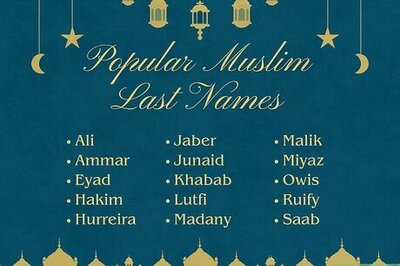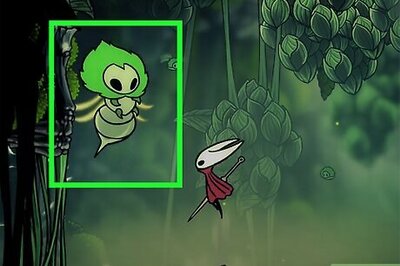
views
An island nation divided is finally united. It is a great irony that an unprecedented economic disaster has brought the entire country together. Something unthinkable just a month ago has happened. Majority Buddhist Sinhalese, minority Tamils (Hindus and Christians), Muslims and Burghers have come together with an aim to end the 74-year-old dynastic, corrupt political system which they hold responsible for all the ills plaguing their emerald island nation.
Sri Lanka has been a divided nation. Divided on the basis of race, religion and class. The colonial power United Kingdom left Ceylon (now Sri Lanka) on February 4, 1948, granting freedom to the native people. But, the deep divisions within the country further divided the island, worsening the situation over the next seven decades. Sinhalese Buddhist nationalism or majoritarianism and the minority Tamils fought a bloody civil war for over 30 years, sacrificing a lakh of innocent people on either side. The radical left-wing Janatha Vimukthi Peramuna or JVP fought with their own Sinhalese people in south and central Sri Lanka, adding another 50,000 headcount to the list of victims.
The extreme form of socialism of the 1960s, economic liberalisation of the late 1970s or the catastrophic tsunami of 2004 failed to bring the people together in the past. It was always a divided nation. Good or bad. And that served very well the wily, corrupt political masters. They used the divide to cement their positions and promote family rule. The ordinary people sometimes grumbled at home but accepted it as a norm or a necessity to save the nation from a bigger enemy or threat.
Sri Lanka is a unique country, where President Chandrika Bandaranaike Kumaratunga had appointed her own mother as Prime Minister, brother as Parliament Speaker and an uncle as defence minister in the past. Jayawardene had his son Ravi and nephew Ranil Wickremesinghe, Premadasa had a notorious son-in-law Jayakody, and there are now dozens of Rajapaksas in the government.
The current economic crisis seems to have ended all that. Tamils in the north and east, Sinhalese in the south and central, Muslims in the east and west, Christians in Negombo— all are fighting for a new Sri Lanka, side by side, shoulder to shoulder.
The fear of a dark future and doom has erased religious and class boundaries, forcing the poor from slums of Obeyasekarapura, the elite of Cinnamon Gardens, the farmers from Nuwara Eliya, and the fishermen from Galle to hold hands and shout, “Gota Go, Go, Go”.
The people who know the bloody past and cultural differences call it a miracle, which they can’t believe even now. Because Sri Lanka is not an easy country. The island nation of 22 million people is a complex nation. Behind its magnificent sun-kissed beaches to misty cold highlands, the country hides something sinister.
It is a fact that the ongoing agitation is mainly against unimaginable scarcities of essential commodities and not really against dynasty or corruption. Because dynastic rule and corruption have been an integral part of Sri Lankan politics since its independence. The Senanayake family, Bandaranaike family, Jayawardene family, Premadasa family and Rajapaksa family have ruled the country over the last 74 years. There was no protest against this kind of arrangement ever in the past.
The country currently under the Rajapaksas has no foreign currency to buy oil, medicines and food from abroad. The Sri Lankan Rupee is falling every day, pushing inflation up and up.
Pushed to the wall, the general public has hit back. If the agitators continue to agitate even after (if at all) the supplies are back on track, one can hope that this protest is for a change, a new beginning. If they go back to their homes after they get the essentials, Sri Lanka will be back to square one.
Many eminent Sri Lankans believe and hope that the youth-led, apolitical movement has already gone beyond food and fuel. They argue that the people will not stop until and unless the ruling Rajapaksa family packs its bags and leaves. Many of them don’t want even the opposition parties to lead the nation, dubbing all of them the same.
Shashi Danatunge, a political analyst based in Colombo said that the youth have already achieved a lot in just one week. “What have they achieved? The entire Cabinet including finance minister Basil Rajapaksa has quit. No one is ready to form a national government. The governor of the Central Bank of Sri Lanka has resigned. The President has been forced to appoint a career central banker in his place. The Parliament is being forced to debate and discuss the ills of family rule and corruption. I consider these developments huge. I am sure, if they don’t lose focus, they can certainly win this battle for the nation,” he said.
Former Sri Lanka cricket captain and legend Roshan Mahanama also echoes these sentiments. Mahanama defied the curfew and came out to protest in solidarity with the young agitators.
The protesters, who have no leader or leaders, want the country to scrap the all-powerful executive presidency, return to a parliamentary democracy, an end to family rule and even a quasi-federal nation. In a divided nation, where the majority Sinhalese Buddhist have always vociferously argued in favour of and supported an all-powerful President, unitary nation, and sometimes just one language till the other day, it is a huge shift indeed.
But, it is not just a domestic issue. A bigger geopolitical war is being fought on the island. China has invested billions of dollars to set up a permanent base closer to south India, America does not want China to control the Indian Ocean, and Sri Lanka’s closest neighbour India does not want any third nation in the vicinity. What these foreign powers will do once the situation is back to normal or even before that is to be seen.
The Greek historian and geographer Ptolemy knew about Sri Lanka 2,000 years ago. He has mentioned it in his book. Ancient Indian kings, Arabs, Portuguese, Dutch and the British all coveted Serendib, Ceylon or Sri Lanka. All ruled it for some time before they were thrown out by some other power.
Political stability is not really the strength of Sri Lanka.
This is Sri Lanka’s finest hour. This is Sri Lanka’s best chance to build a new nation on the ruins of corruption and dynasty.
Will they succeed? Only time will tell.
Read the Latest News and Breaking News here


















Comments
0 comment